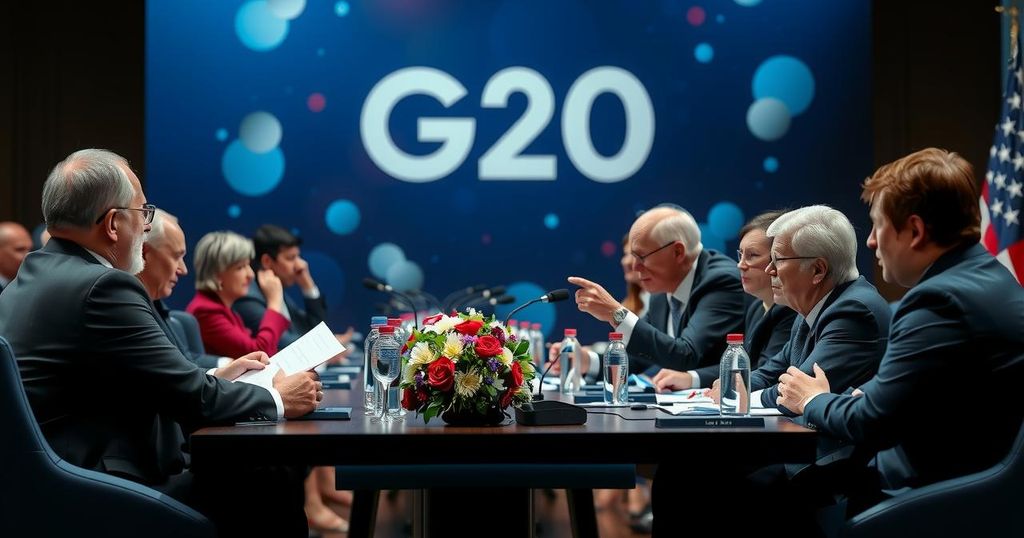The G20 summit in Rio de Janeiro, Brazil, focuses on critical global issues such as the Ukraine conflict, Middle East tensions, climate change, and Donald Trump’s return to political prominence. With Biden attending his final summit, countries are exploring discussions on climate finance and geopolitical tensions amid calls for action to combat poverty and hunger. The success of the summit hinges on reaching consensus on these pressing concerns.
Leaders from the G20 nations convened in Rio de Janeiro, Brazil, to address critical global challenges, including conflicts in the Middle East and Ukraine, climate change, and the implications of Donald Trump’s recent election victory. Brazilian President Luiz Inácio Lula da Silva hosted the summit, hoping to reignite stagnant climate discussions and navigate the geopolitical tensions that have hindered consensus among member states. With a focus on significant issues such as hunger, climate action, and taxation of the wealthy, the summit reflects the urgent need for cooperation amid the backdrop of ongoing conflicts that have divided the G20. As the summit unfolds, U.S. President Joe Biden attends what may be his final G20 meeting, overshadowed by Chinese President Xi Jinping. The Brazilian government has indicated that while a final draft communiqué exists, there is ongoing debate among countries concerning the wording on wars and climate initiatives. Biden’s recent policy shift allowing Ukraine greater military flexibility may lead to shifts in European allies’ positions as well. The summit is concurrently significant for its implications for climate negotiations, where G20 countries, responsible for the majority of global emissions, are under pressure to provide funding mechanisms for developing nations. UN Secretary-General Antonio Guterres emphasized the need for the G20 to take a leading role in fostering a viable climate finance solution at the stalled COP29 conference in Azerbaijan. In addition, Brazil highlighted the urgency of addressing climate change, especially following extreme weather events like unprecedented wildfires exacerbated by drought impacts. However, the absence of Russian President Vladimir Putin due to an International Criminal Court arrest warrant adds another layer of complexity to the discussions. Lula has expressed a desire to keep focus on poverty and hunger issues, stating, “Because if not, we will not discuss other things which are more important for people that are not at war, who are poor people and invisible to the world.” The summit also seeks consensus on contentious issues, including taxation of billionaires, amidst differing opinions from other leaders, including Argentine President Javier Milei. In conclusion, the G20 summit in Brazil aims to navigate several pressing global challenges by encouraging dialogue on climate finance, geopolitical conflicts, and poverty alleviation. While the prospects for groundbreaking agreements appear limited, the discussions will undoubtedly shape future international cooperation and policy decisions among the world’s leading economies. Brazil’s leadership in hosting this summit underscores its commitment to addressing not only environmental issues but also broader social inequalities that prevail amidst global conflict. The success of the summit will depend on the ability of leaders to find common ground on these critical issues that affect millions worldwide.
The G20 summit represents a gathering of the world’s largest economies, aimed at fostering international economic cooperation, addressing significant geopolitical concerns, and tackling pressing global challenges such as climate change and regional conflicts. Current geopolitical tensions, particularly concerning the Middle East and Ukraine, complicate discussions and consensus-building among member nations. With Donald Trump’s return to the political landscape as a former president of the United States, there is added complexity regarding U.S. foreign policy and international relations. Additionally, climate change remains a primary focus, as nations aim to address the consequences of environmental degradation while facilitating sustainable development in emerging economies.
The G20 summit in Brazil is poised to confront crucial global challenges, underscoring the complexities of international diplomacy. As leaders engage in discussions on climate change, conflict resolution, and social equity, finding a cohesive path forward remains imperative. The issues at hand, particularly the ongoing warfare in Ukraine and the Middle East, alongside urgent climate action needs, will test the resolve and capabilities of the G20 as they strive to achieve consensus and substantive agreements.
Original Source: www.france24.com






